

The 7 Styles Of Learning: Which Works For You? 508442. Kinesthetic Learning: Moving Toward a New Model for Education. How do people learn?
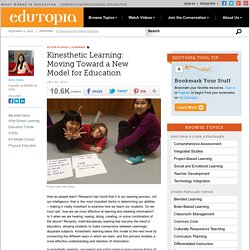
Research has found that it is our learning process, not our intelligence, that is the most important factor in determining our abilities -- making it vitally important to examine how we teach our students. So we must ask: how are we most effective at learning and retaining information? Is it when we are hearing, seeing, doing, creating, or some combination of the above? Quality Teaching for Diverse Students in Schooling: Best Evidence Synthesis Iteration (BES)
BES (Iterative Best Evidence Synthesis) Programme This report is available as a download (please refer to the 'Downloads' inset box).
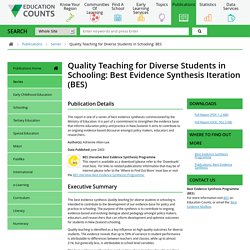
For links to related publications/ information that may be of interest please refer to the 'Where to Find Out More' inset box or visit the BES (Iterative Best Evidence Synthesis) Programme. Executive Summary This best evidence synthesis Quality teaching for diverse students in schooling is intended to contribute to the development of our evidence-base for policy and practice in schooling. The purpose of the synthesis is to contribute to ongoing, evidence-based and evolving dialogue about pedagogy amongst policy makers, educators and researchers that can inform development and optimise outcomes for students in New Zealand schooling.
Quality teaching is identified as a key influence on high quality outcomes for diverse students. The concept of 'diversity' is central to the synthesis. 1. Research-based characteristics 2. 3. 4. 5. 6. 7. 8. 9. Alan November: How Teachers and Tech Can Let Students Take Control. For many educators, helping students direct their own learning is a priority.
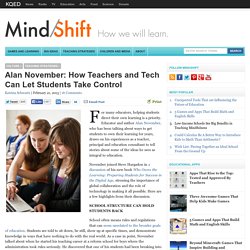
Educator and author Alan November, who has been talking about ways to get students to own their learning for years, draws on his experiences as a teacher, principal and education consultant to tell stories about some of the ideas he sees as integral to education. November joined Steve Hargadon in a discussion of his new book Who Owns the Learning: Preparing Students for Success in the Digital Age, stressing the importance of global collaboration and the role of technology in making it all possible.
Here are a few highlights from their discussion. School often means rules and regulations that can seem unrelated to the broader goals of education. Students are told to sit down, be still, show up at specific times, and demonstrate knowledge in ways that have nothing to do with the real world. The lesson from this, he said, is to “teach students how to solve any problem, a general problem solving approach. Related. Ask Professor Pedagogy: Learning Styles. Dear Professor Pedagogy, My students often tell me that they’re “visual learners” as they request more visual media in the course.
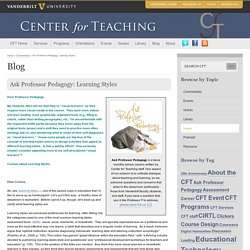
They want more videos and less reading, more graphically organized tests (e.g., filling in charts, rather than writing paragraphs), etc. I’m uncomfortable with the requested shifts partly because they move away from the original texts (prose) and a skill they need to practice more often (writing), but I’m also wondering what to make of their self-diagnoses as “visual learners.” I know some people are big fans of the concept of learning styles and try to design activities that appeal to different learning styles. Is this a worthy effort? Curious about Learning Styles Dear Curious, Ah, yes, learning styles — one of the sacred cows in education that I’d like to serve up as hamburgers! What’s wrong with this idea?
First, let me be blunt. I would add another reason why learning styles may be so popular. Professor Pedagogy References Bransford, J. Butler, D. RuthvenAERA12slidesnotes.pdf. May06_article01. Table 3 Development Phase Legend:Ť: Main Task to be performed by the content developerŦ: Sub-task to be performed by the content developerĂ: Task that is automatically performed by system without the need for human intervention Due to length constraints, this paper will only focus on the pedagogy considerations of e-learning.
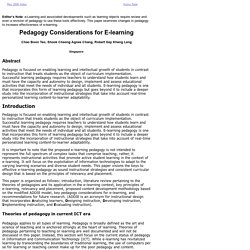
Specifically, the instructional strategies (micro-level), learning events classification (macro-level) and scaffolding framework will be discussed. Table 4 Implementation Phase Table 5 Evaluation Phase. EdPractices_19.pdf. 516147.